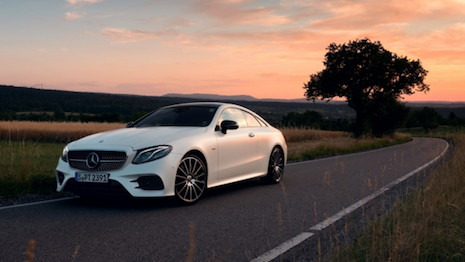- About
- Subscribe Now
- New York,
October 5, 2018

 Mercedes-Benz scored higher than any other brand by the report's metric. Image credit: Mercedes-Benz
Mercedes-Benz scored higher than any other brand by the report's metric. Image credit: Mercedes-Benz
German automakers Mercedes-Benz and BMW are the most valuable luxury houses in Interbrand's Best Global Brands 2018 report, while Gucci and Louis Vuitton are among the fastest-growing companies overall.
The combined total value of the 100 most valuable brands is more than $2 trillion, an increase of 7.7 percent from 2017. Other luxury brands appearing on the list include Chanel, Hermès, Audi and Porsche.
"Hermès has been the only luxury brand to have sustained double-digit increase in brand value, continuously, for the past 5 years," said Rebecca Robins, global chief learning and culture officer at Interbrand. "LVMH is the only luxury group to have more than one brand in the top 100, with a total of three brands: Louis Vuitton, Dior and Hennessy."
The top five brands overall for 2018 are Apple, Google, Amazon, Microsoft and Coca-Cola.
Luxury leaders
Luxury — defined by Interbrand as high-end fashion labels and jewelers — is the top growing sector, at a rate of 42 percent. Automotive was the most-represented category with 16 brands, including Land Rover and Ferrari.
Ranked 8th overall, Mercedes-Benz grew 2 percent for a value of $48.6 billion. BMW's $41 billion value decreased 1 percent in the last year.
Gucci is the fastest-growing luxury brand. Image courtesy of Gucci
Gucci grew 30 percent for a valuation of $12.9 billion, while Louis Vuitton's $28.1 billion brand value jumped up 23 percent.
Both Gucci and Louis Vuitton propel their own growth through innovation in the digital realm to provide customers with better shopping experiences. The labels were ranked in first and second place, respectively, in Gartner L2's Digital IQ Index for luxury fashion (see story).
French fashion label Chanel appeared on Interbrand's Global Brand list for the first time since 2009, placing 23rd with a brand value of $20 billion.
Chanel last appeared on Interbrand's Top 100 in 2009. Image credit: Chanel
While its status as a privately-owned company means that Chanel does not have to publicize its results, the house opted to publish its financial figures for the first time in its history this summer. Chanel revealed that its sales totaled $9.62 billion in 2017, an increase of 11 percent from the previous year (see story).
Burberry, which ranked 94th, joined BMW as the only premium brands to see a decrease in brand value over the last year. LMVH's Hennessy, like Chanel, last appeared on the list in 2009 and landed in the 98th spot with a brand value of $4.7 billion.
Fostering growth
In addition to financial performance, Interbrand evaluated companies' competitive strength and customer loyalty.
Creating a meaningful connection with consumers has an impact on retailers’ bottom lines, as a new report finds those who feel emotionally tied to a brand have a lifetime value that is 306 percent higher than those who are merely satisfied.
According to a study by Motista, emotionally-connected customers remain loyal to brands for longer, and spend up to two times more in a year. Coupled with a growth in annual spend, creating deeper relationships can lead to a greater lifetime value for retailers (see story).
Chanel’s use of quality customer service and products as well as its emotional connection with consumers have pushed it to the top of the Luxury Institute’s 2018 Emotionally Intelligent Brand Index. The brand was closely followed by another French brand, Louis Vuitton (see story).
"We are seeing a resurgence of the modern legacy brands," Ms. Robins said. "The top-growing brands are connecting culture on the inside of the business into the cultural zeitgeist, both creating and sustaining more responsive and relevant ecosystems of demand and desire."
Share your thoughts. Click here